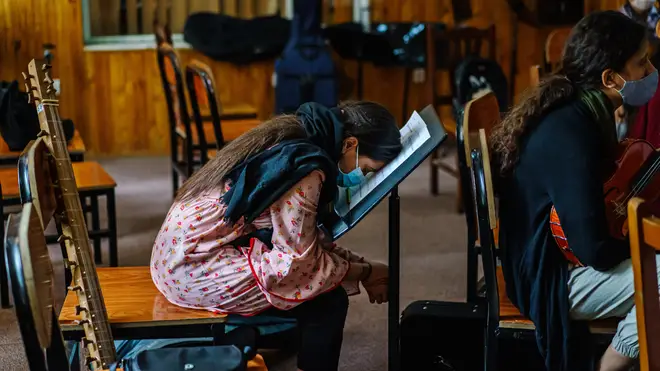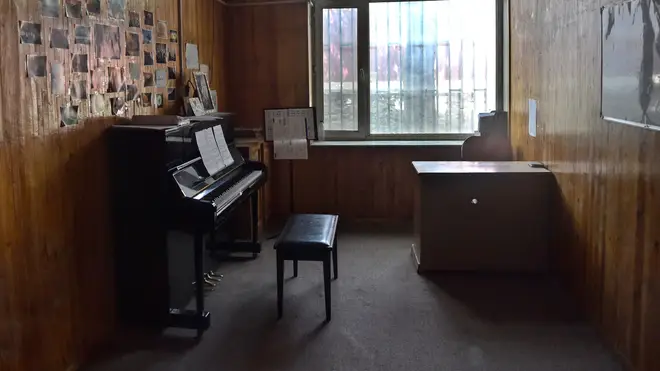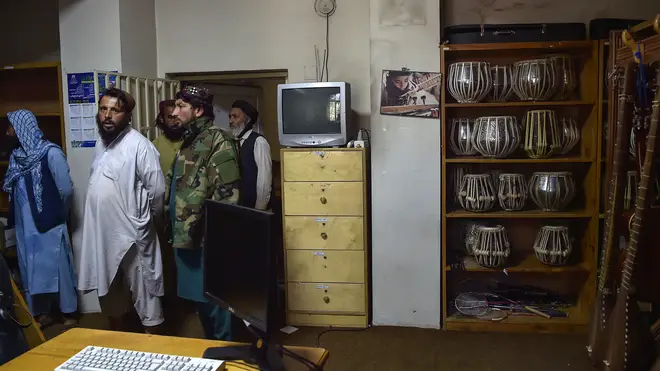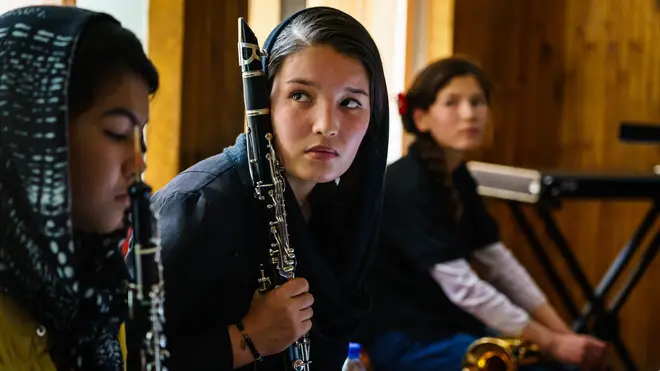As musicians flee, Afghanistan's music scene tilters on the edge of silence
12 October 2021, 17:50 | Updated: 12 October 2021, 23:27

It’s been almost two months since the Taliban seized control of Afghanistan and its music hangs on the edge of silence. Whilst the Taliban have yet to formally ban instrumental music again, musicians have attempted escape fearing for both their livelihoods and their lives.
In the 1990s, the Taliban effectively banned music across Afghanistan.
Under the regime, instruments were destroyed, and the only music allowed on radio was religious chants or taranas, songs praising the work of the Taliban. Celebrating weddings with dancing and music was also banned.
Consequently, the November 2001 fall of the Taliban regime brought about a rebirth of music in Afghanistan. Musicians returned to the country from exile and within 48 hours, Radio and Television stations were back on air with live performers.
In 2021, two months after the Taliban takeover, whilst there is yet to be an outright music ban, playing music in public has been outlawed, as has performing live music in hotels.
Read More: Taliban executes folk singer after announcing a public music ban in Afghanistan

Afghanistan’s capital, Kabul, and other big cities have gone almost silent.
Now the only prominent sounds are the Taranas which are once again being played on airwaves and from loudspeakers; these songs have long existed in Afghan culture however, are notable for their use as propaganda by the Taliban.
Musicians meanwhile fear for their lives. Many are scared to perform, and have made attempts to flee the country.
Most need not wait for the outright music ban to understand the danger music is in. Photos of destroyed musical instruments have gone viral across social media, and those who lived through the 1990s takeover can already see the similarities of this perhaps inevitable ban.
Taliban spokesperson Zabihullah Mujahid told the New York Times in a recent interview that music is “un-Islamic” and “forbidden in Isalm.”
“[W]e're hoping that we can persuade people not to do such things, instead of pressuring them,” Mujahid added.

Zohra Orchestra
Based at Afghanistan’s National Institute of Music in Kabul, the Afghan Women’s Orchestra ‘Zohra’ is the country’s first all-female orchestra, named after the music goddess in Persian writings.
Many of its members have travelled the world, performing at world-class venues such as Carnegie Hall and high-profile events such as the World Economic Forum.
On the 14th August the orchestra was rehearsing for an upcoming performance in Colombia. One day later, the capital city Kabul, where they rehearsed, fell to the Taliban.
The Afghanistan National Institute of Music has since been taken over and been made into a military base for the Haqqani Network. The group has been coined as ‘Afghanistan's most feared militants’.

Afghan Women's Orchestra perform Ode To Joy at World Economic Forum in Davos
Founded in 2010 by Dr Ahmad Sarmast, the Afghanistan National Institute of Music (ANIM) is the first and only school of music in the country.
The school has a special focus on supporting the ‘most disadvantaged group of the Afghan society – orphans, street working children, women, and girls’.
The Zohra Orchestra started as a small chamber group before growing into what is now a twenty-five-piece orchestra.
Students of ANIM have been attempting to flee the country for weeks, and a second evacuation attempt aided by Yo-Yo Ma at the start of October successfully managed to get roughly a third of the music school out of the country.

93 students, teachers and musicians were flown to Doha, Qatar.
Originally misreported as 101, director Dr Sarmast commented on the escape of his students saying, “One hundred lives have been saved. One hundred dreams have been saved.”
The orchestra will remain in Doha before travelling to Portugal, where it is hoped the Institute will rebuild. The remaining members of the school didn’t have valid passports and were forced to remain in the country where now many have gone into hiding.
In 2014, a suicide bomber was sent by the Taliban to a concert at ANIM where an audience member and the bomber was killed. Many more were injured including Director Dr Sarmast, who was nearly killed and lost some of his hearing.
Members of the orchestra have spoken to anonymously to media outlets about the situation they find themselves in. An 18-year-old violinist speaking to the Washington Post heartbreakingly commented, “The only life I want is one where I can freely play my violin.”

Pakistan
According to the United Nations High Commissioner for Refugees (UNHCR) Pakistan is home to more than 1.4 million registered Afghan refugees.
Pakistan lies to the east of Afghanistan and the border between the two countries is marked by 235 crossing points. Many of these crossing points have become susceptible to illegal immigration and cross-border infiltration.
Since the Taliban takeover in August, Pakistan has received thousands more Afghan refugees. Al Jazeera spoke to musicians who had fled Afghanistan to Pakistan who told the media outlet that they were “personally threatened by Taliban fighters if they did not find a new profession.”
Every musician interview by Al Jazeera reportedly commented on how they were “uncertain as to how to next proceed, with no clear path in sight.”
What happens next?
Afghanistan's flourishing music scene of the last 20 years looks like it will imminently fall completely silent.
Musicians reportedly refuse to show up to play at weddings, ceremonies which have traditionally featured live music.
There are widespread reports of musicians applying for visas abroad in order to leave the country, and musicians including Conductor Sir Simon Rattle, pianist Mitsuko Uchida and former cellist and broadcaster Julian Lloyd Webber have called for the UK to grant entry to silenced Afghan musicians.
For now, musicians in Afghanistan and across the world wait with baited breath to see when, as opposed to if, the outright ban on music is imposed.


































